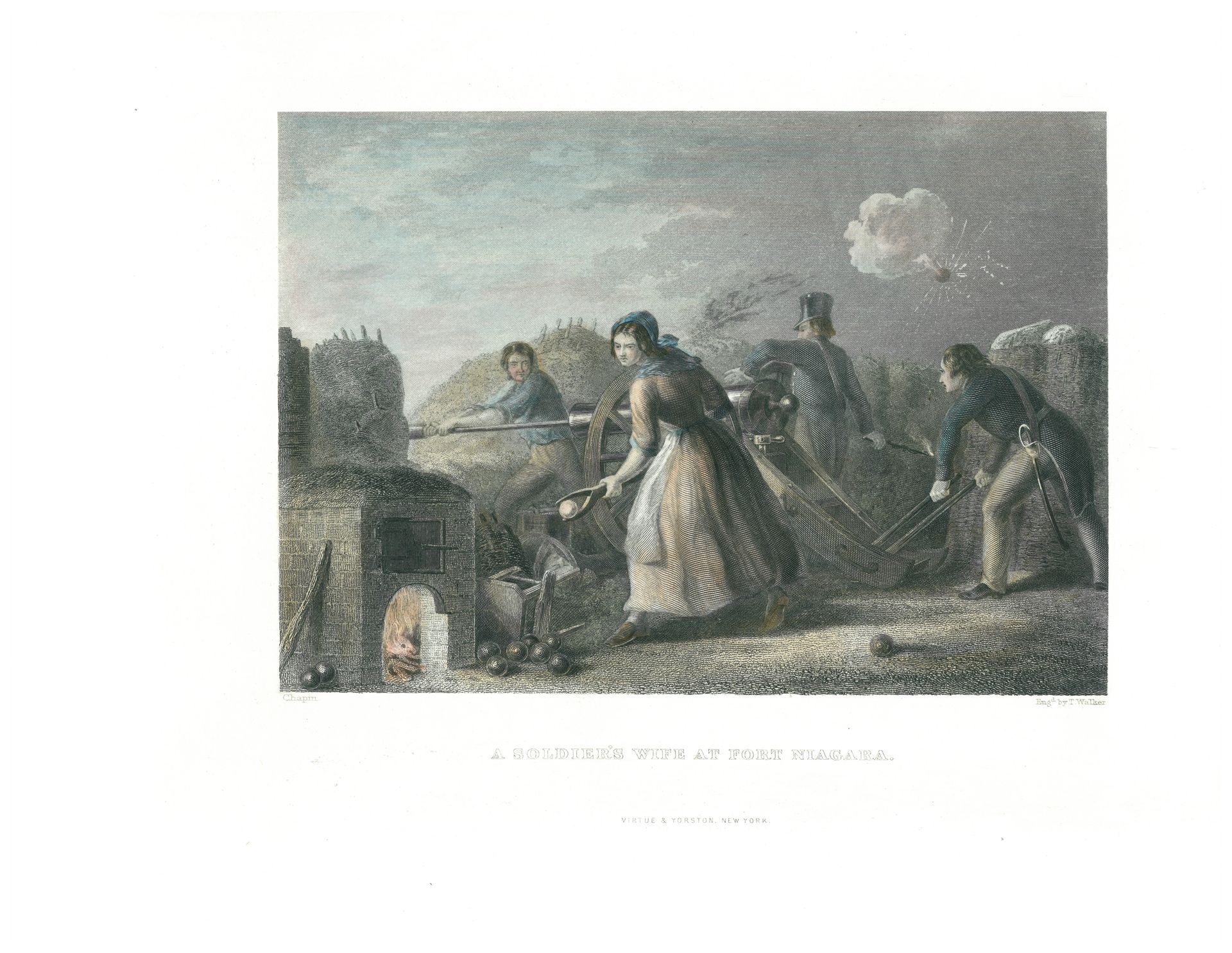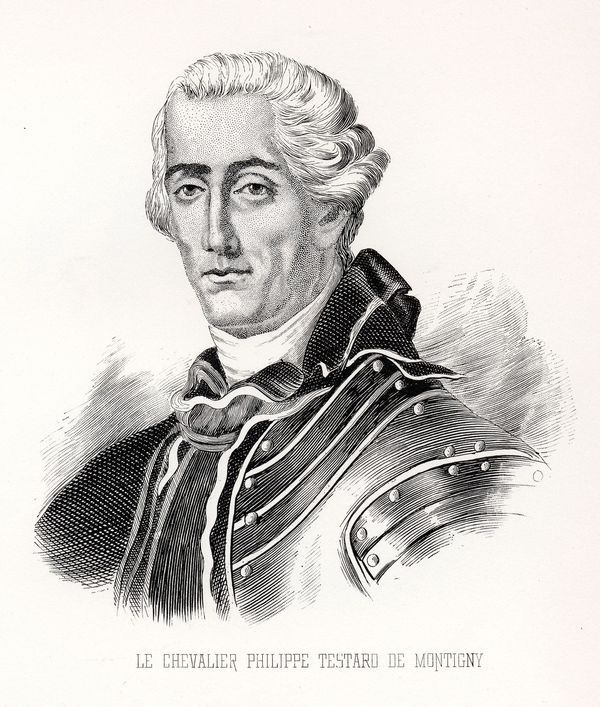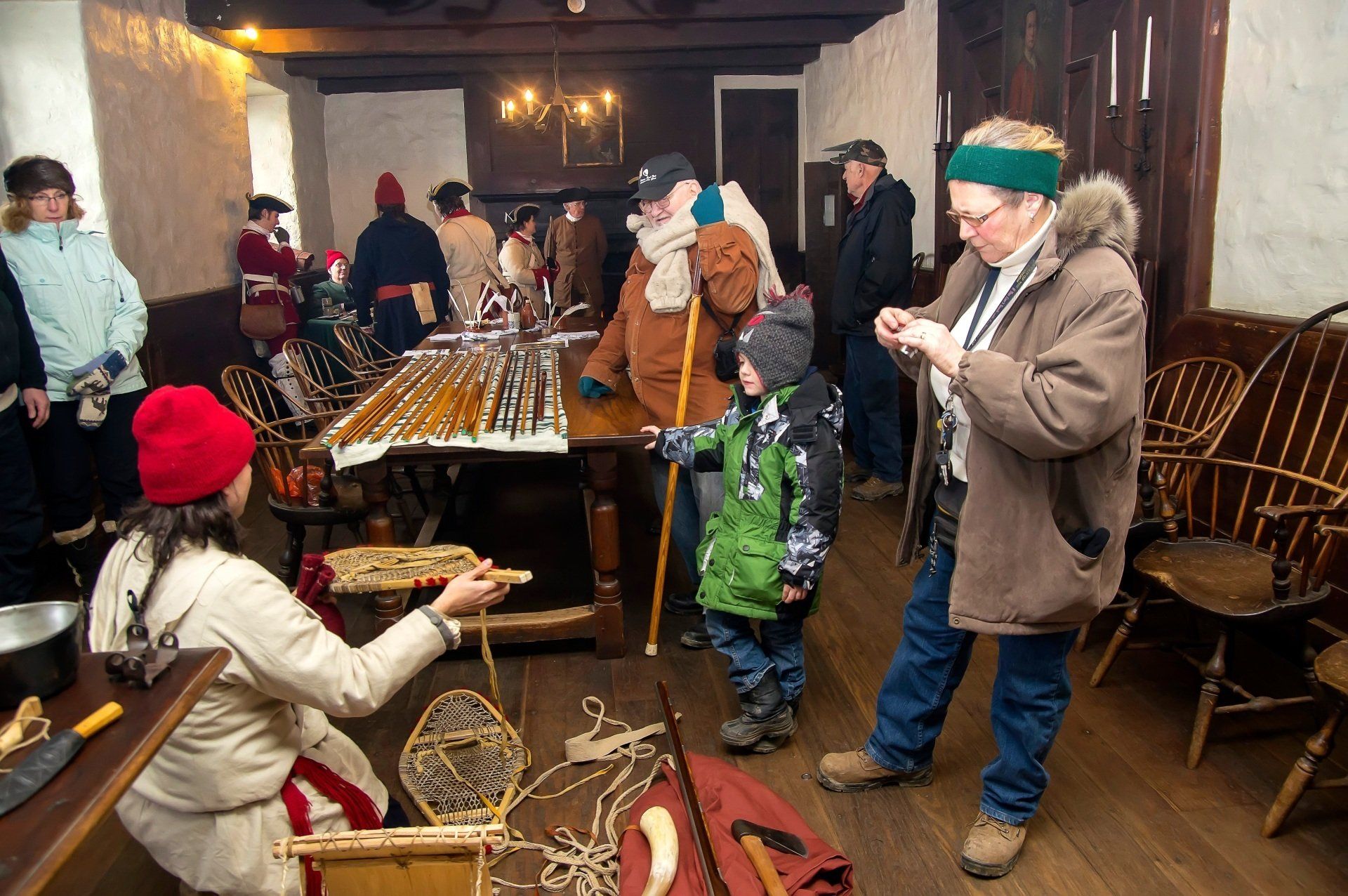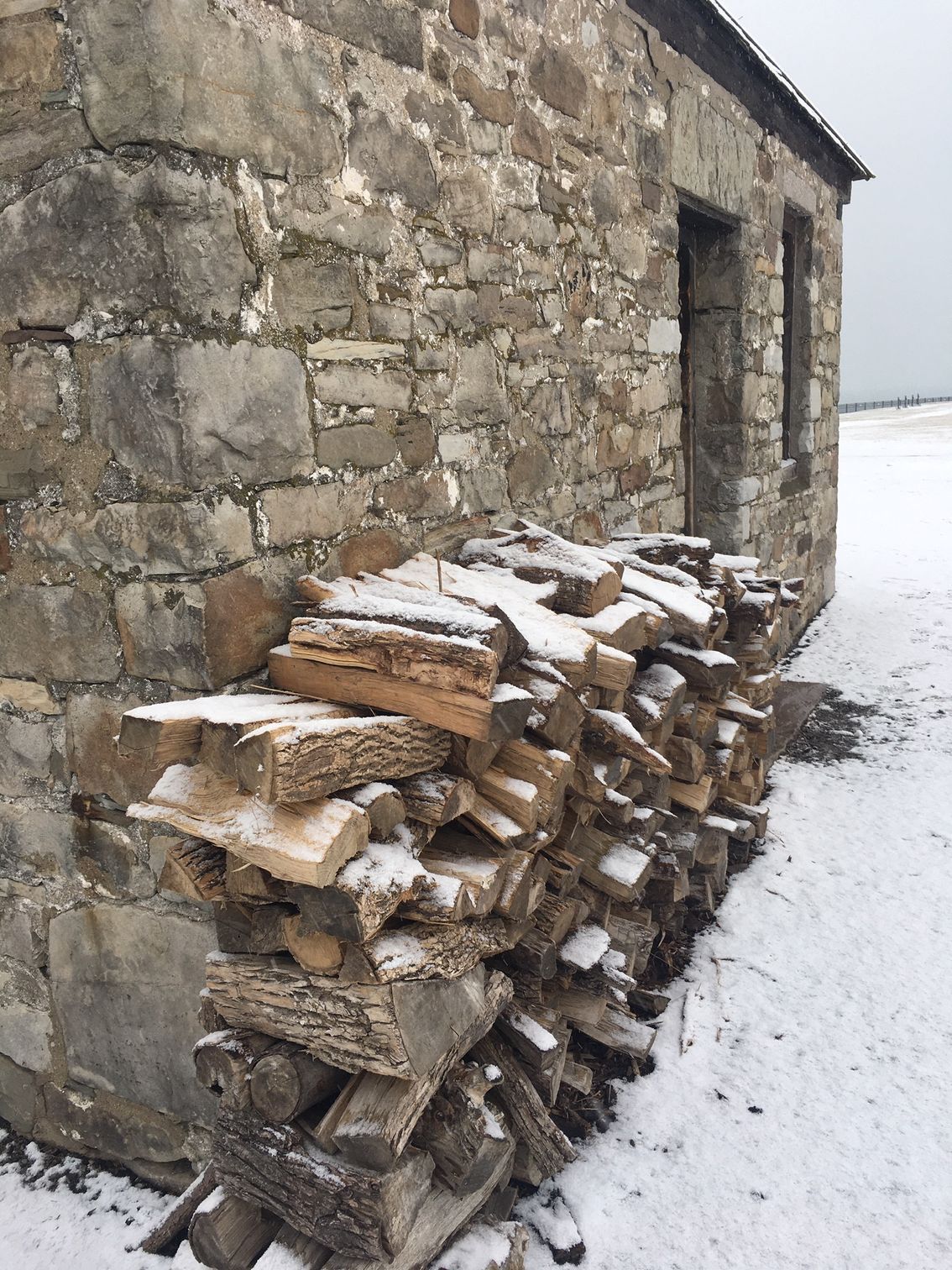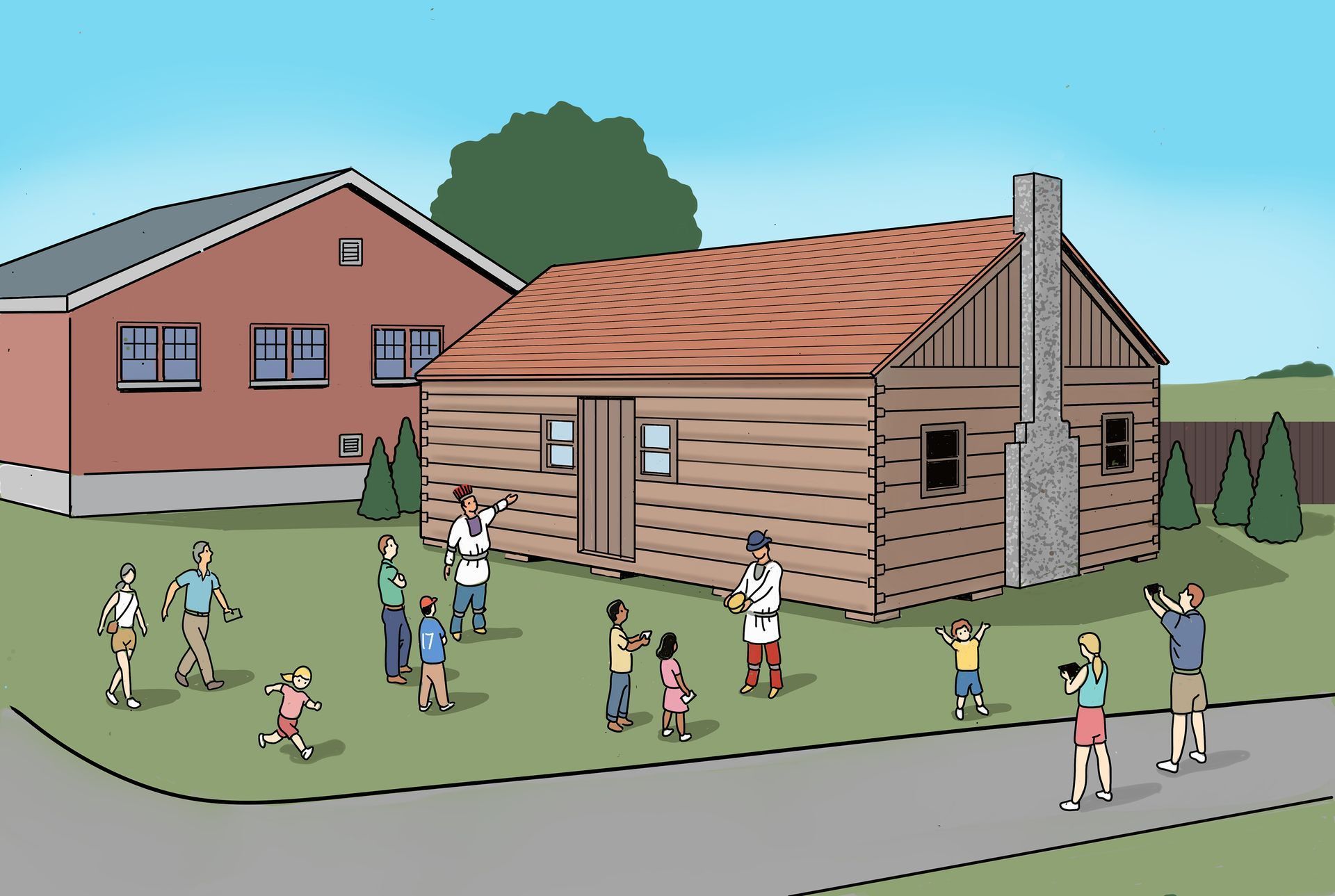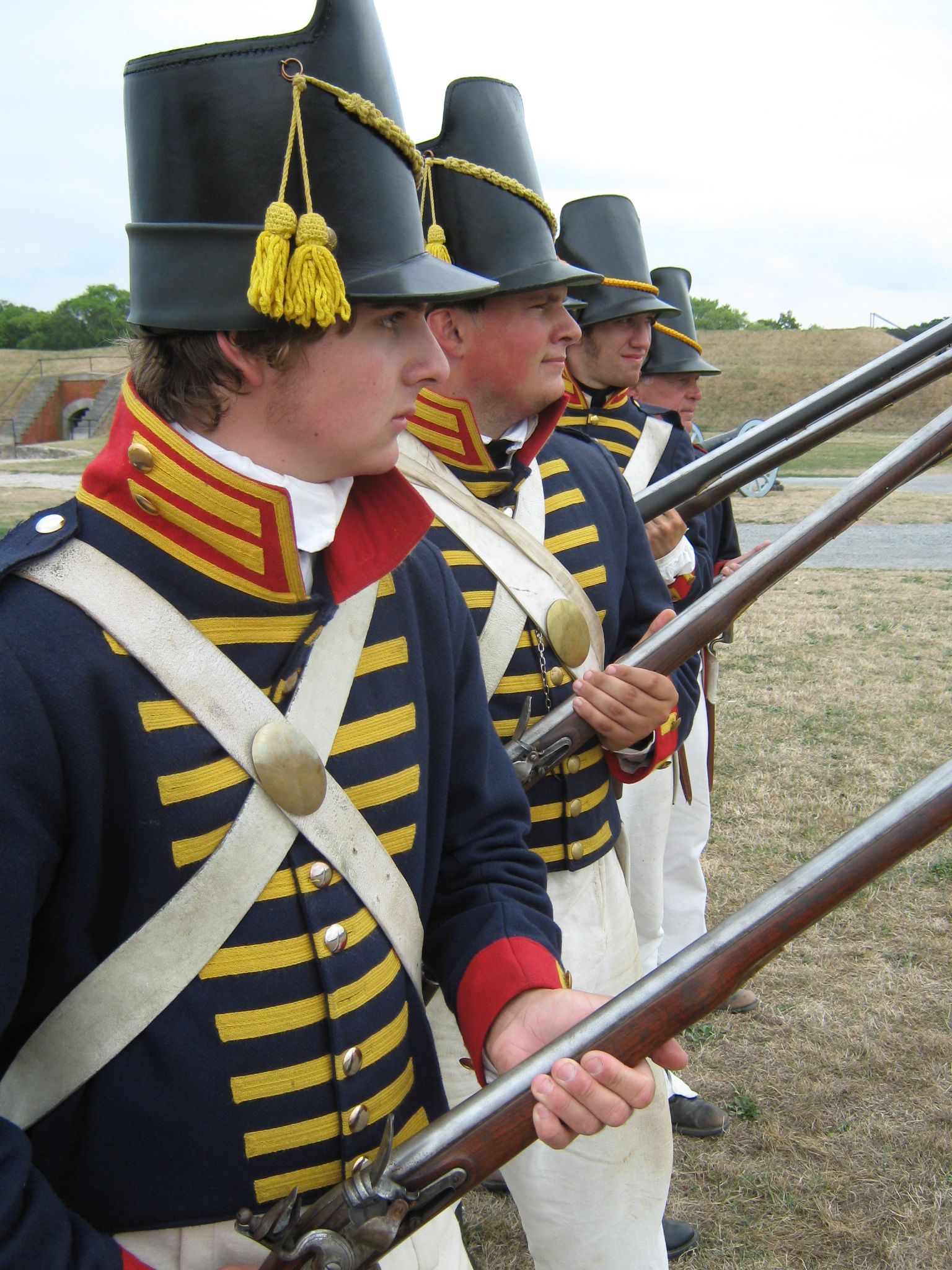August 22, 2024
Magasin a Poudre/Institute d' Honneur Visitors who enter Old Fort Niagara through the South Redoubt are first impressed with the French Castle, standing on the far side of the parade ground. Less noticed perhaps is the tall, almost windowless building to the left; the Powder Magazine. Erected in 1757, at the high water mark of French fortunes during the French and Indian War, the magazine today reminds us of France's far-flung North American empire at its zenith. It also stands as a monument to its designer, Captain Pierre Pouchot who created a structure that survived a desperate siege and was used for ammunition storage into the twentieth century. Powder magazines may not be the most interesting of structures, until something goes wrong. History is full of accounts of gunpowder supplies exploding with disastrous consequences. One of the earliest recorded incidents of accidental explosion occurred in 1280 when Mongols blew up a Chinese arsenal through carelessness. Erasmus described a devastating explosion in Basel, Switzerland in the early 16 th century and a powder supply in Delft, Holland exploded on October 12, 1654 destroying much of the city. In this last incident, about 40 tons of powder, stored in a magazine that formerly served as a Clarissen convent, blew up when the magazine's keeper, Cornelis Soetens, opened the door of the magazine to check a sample of the powder. Over a hundred people were killed and thousands injured. Luckily, many of the city's residents were away from home. The damage was portrayed by the artist Egbert van der Poel in his painting A View of Delft After the Explosion of 1654. The stakes were indeed high; one spark could wreck a fortress or town and kill half of its inhabitants. During late medieval times, gunpowder was often stored in towers located along a castle's outer perimeter. As the capabilities of artillery improved, the folly of this practice became obvious. During the sixteenth century, military engineers began to design specialized buildings to store gunpowder. These designs were gradually improved and somewhat standardized by the 18 th century. The safest place for a powder magazine was underground, in a chamber roofed with heavy beams and covered with a deep layer of earth. Mortar bombs and other incoming fire would spend itself harmlessly in the dirt and the garrison would live to fight another day. Most forts built in North America featured just this kind of magazine. 1 The disadvantage of underground magazines was dampness. Gunpowder that drew damp became little more than a useless sooty black paste. Above-ground storage was certainly a better option for keeping the powder dry, but such magazines were much more exposed to enemy fire. To compensate, they had to be built with thick stone walls, and arched ceilings to render them bombproof. During the seventeenth century, the preeminent military engineer of the age, Sebastien Le Prestre de Vauban (1633-1707) standardized magazine design in France. Vauban's designs were single-story stone buildings with thick walls, stone arched ceilings that were designed to withstand artillery fire, steep gabled roofs, and buttresses that strengthened the arch. Inside the building, raised wooden floors and wood-lined walls helped keep out the damp. Often, crushed stone or chips underlay the floor, further promoting a dry atmosphere. Perforated iron plates and masonry dice (baffles), set into the walls, allowed air into the magazine without exposing the building's contents to flying embers or sparks. Vauban's magazines were designed to house 45-60 tons of gunpowder. Examples of Vauban's work can be seen at Gravelines near Dunkirk, at Fort Barraux, near Grenoble, and on the Crozon Peninsula in Brittany. 2 Vauban's designs provided a valuable starting point for Captain Pierre Pouchot as he set out during the winter of 1756-57 to construct a new powder magazine at Fort Niagara. Pouchot had spent the winter of 1755 and the first half of 1756 at Fort Niagara erecting temporary barracks and constructing massive earthworks designed to withstand artillery fire. From this time he undoubtedly realized that the existing magazine at the west end of the French Castle was far too small to house the powder supply an expanded fort would need. After a brief sojourn at the siege of Oswego (see the March 2006 issue of Fortress Niagara), and a road building assignment at La Prairie, Pouchot returned to Fort Niagara in October 1756 to complete the transformation of the post. This time he was placed in command of the Fort, a post that had previously been reserved for officers of the colonial regulars (compagnies franches de la Marine), not regular army officers from France. On his journey to Niagara, he was accompanied by soldiers from three army regiments, his own Bearn Regiment, the Guienne Regiment, and the La Sarre Regiment. Pouchot sited his new powder magazine at the southern end of the enlarged fort, next to a newly built provisions storehouse. To make room for the magazine, he tore down a temporary barracks that had been constructed the year before. Pouchot probably imported the stone for the magazine from Cataraqui (Fort Frontenac) where modern Kingston, Ontario stands today. The stone was transported across Lake Ontario aboard a fleet of sailing vessels that France maintained on Lake Ontario. In addition to the magazine, Pouchot superintended the construction of new log barracks, storehouses, a forge, stable, hospital and church. In January 1757 he dispatched a report to the Marquis de Montcalm reporting progress on these buildings. Bitter cold however, retarded the work. Construction continued through the spring and summer months, and as of May, Montcalm recorded that the magazine at Fort Niagara was not yet finished. During this time, Pouchot had more on his mind than construction. Relations with Native allies from the Great Lakes and Midwest consumed much of his time as hundreds of warriors gathered at Niagara. Some came to form war parties to attack English settlements to the south, while others passed through on their way east to join the French Army in an attack on British Fort William Henry on Lake George. News of French victories the previous year had traveled fast and Ottawas, Ojibwas, Menominees, Potawatamies, Winnebagoes, Fox, Sauk, Miami, and even Iowa warriors now made their way to Fort Carillon (Ticonderoga) where the French Army assembled for its descent on Fort William Henry. Here, nearly 2,000 Native warriors gathered to support the French. Rumors that victors would be “swimming in brandy” and that Montcalm was willing to ransom prisoners motivated Native warriors to travel as far as 1,500 miles to participate in the battle. In all, 33 nations were represented, the largest assemblage of Native warriors ever to take the field to support the French cause. Many of the warriors traveling through Niagara from the west left their women and children at the Fort to be cared for while they took the field. 3 By September, 1757, Pouchot could report that Fort Niagara and its buildings were finished and its covered ways stockaded. His task completed, Pouchot was relieved of his command in October 1757. In his memoirs he wrote “Since this fort was a very considerable one, because of its position and the large number of Indians who had dealings there and came from all parts to trade and form war parties, it was soon coveted by all of the officers of the colony.” 4 Pouchot was relieved by Captain Jean Francois de Vassan of the colonial regular troops. The magazine Pouchot left behind was one of the largest in the colony, designed to hold up to 50 tons of gunpowder. The building's four-foot thick stone walls, earth covered arched ceiling, and steep gabled roof is strikingly similar to Vauban's standard designs that graced fortresses throughout France. Conspicuously missing from Pouchot's magazine, however, were the massive stone buttresses that Vauban used to strengthen the arched ceilings of his magazines. Whether these were omitted as a frontier expedient or through inexperience is not known. Regardless, Pouchot left the Fort with a substantial above-ground powder magazine that was capable of withstanding the artillery that British forces were likely to drag and float west from the Mohawk Valley. Inside the building, wooden racks extended from floor to ceiling, holding hundreds of powder casks, each of about 50 pounds capacity. In all, about fifty tons of gunpowder could be safely stored until needed. Ironically, much of the powder stored in the magazine during the final years of French occupation may have been British in origin, captured from General Edward Braddock or at the fall of Forts Oswego and William Henry. The question arises, why such a large magazine? The answer lies in the Fort's own need for a large powder supply and its role as a supply depot for other French posts in the upper Great Lakes and the Ohio Valley. By 1757 Fort Niagara was well armed with 30 pieces of artillery including twelve 12-pounders according to Captain Francois Marc-Antoine Le Mercier, commandant of artillery in New France. 5 In the event of a protracted siege, a large powder supply would be necessary, as subsequent events were to demonstrate. Fort Niagara also forwarded powder supplies to posts in the upper Great Lakes and in the Ohio Valley. A good supply of gunpowder was especially important at Fort Duquesne (Pittsburgh) not only to defend the Fort itself, but also to supply the numerous native warriors that frequented the post. In addition to some 250 soldiers, Fort Duquesne at times hosted up to 500 Native allies who carried out raids on the frontiers of Pennsylvania, Maryland, and Virginia. During the course of the war, these raiding parties killed approximately 1,500 settlers, carried off 1,000 more as prisoners and drove even more from their homes. 6 To keep these warriors in the field, it was necessary to provide supplies, including gunpowder, most of which had to come through Fort Niagara. As Governor Vaudreuil explained in 1758: ...tis impossible to avoid the consumption of powder in war...there is no country where so much of it is consumed, both for hunting and distribution among the Indians; burning of powder is equally a passion among the Canadians, but I think we gain thereby in the day of battle, by the correctness of their aim in firing. 7 Fort Niagara's powder magazine's greatest test came two years after its construction when it endured the siege of 1759. Not only did the structure survive a week long bombardment by British artillery, it saw service disbursing an estimated 24 tons of powder in defense of the Fort. 8 A British inventory taken after the Fort's capture revealed that 15,000 pounds of bulk powder remained. Prior to surrendering the Fort, French officers were said to have locked personal valuables in the magazine to prevent their theft. 9 As the years passed a few changes were made to the building. Prior to the American Revolution, the British added a small entryway that survives today and added buttresses to the building exterior. These were removed in the mid-19 th century when windows and ventilation slits were also added. The building remained sound for ammunition storage into the twentieth century; as late as World War One, the United States Army stored ammunition in Pouchot's magazine. Perhaps the most infamous story surrounding the magazine is the incarceration there of William Morgan, an early nineteenth-century anti-Masonic activist. Morgan was imprisoned in the magazine just before his mysterious disappearance in 1826. Following its restoration between 1932 and 1934, the powder magazine served as an exhibit building, containing orientation exhibits. Restoration of the building was made possible through the generosity of Wallace I. Keep and the building was dedicated as L' Institut d' Honneur on October 5, 1935. Ironically, the plaque dedicating the building lists its builder as Captaine Francois Pouchot. With the opening of the Visitor Center in 2006, the building interior was cleared of exhibits and will be restored in 2007 to its 18 th century appearance through a special projects grant from the United States Department of Housing and Urban Development. Used as ammunition storage, a vault for valuables, a prison, and an exhibit gallery, the powder magazine's changing usefulness has allowed it to survive where many others have crumbled. Notes: 1 Travelers wishing to visit an underground magazine from this period can tour one at Fort Ligonier in Ligonier Pennsylvania. Photographs and drawings of this structure can be found in Charles Morse Stotz, Outposts of the War for Empire, (Historical Society of Western Pennsylvania, 2005) pp 172-175. 2 See Christopher Duffy, Fire and Stone: The Science of Fortress Warfare, 1660-1860 (Greenhill Books, London 1996) pp. 91-92. See also Paddy Griffith, The Vauban Fortifications of France (Osprey Publishing, Oxford, 2006). 3 See Ian Steele, Betrayals: Fort William Henry and the “Massacre” (Oxford University Press, 1990). 4 Pierre Pouchot Memoirs on the Late War In North America Between France and England, Brian Dunnigan, ed.(Old Fort Niagara Association Youngstown, NY 2004) p. 133 5 E. B. O'Callaghan ed. Documents Relating to the Colonial History of the State of New York : (15 vols.: Albany, 1856-1877), X, p. 656 6 See Matthew C. Ward, Breaking the Backcountry: The Seven Years War in Virginia and Pennsylvania. 1754-1765. (University of Pittsburgh Press 2003). 7 M. de Vaudreuil to M. de Massiac, Nov. 1, 1758. DRCHSNY v. X p. 863 . 8 Pouchot, Memoirs p. 237 9 Brian Leigh Dunnigan Siege-1759 The Campaign Against Niagara, (Old Fort Niagara Association, Youngstown, NY 1996) p. 106

